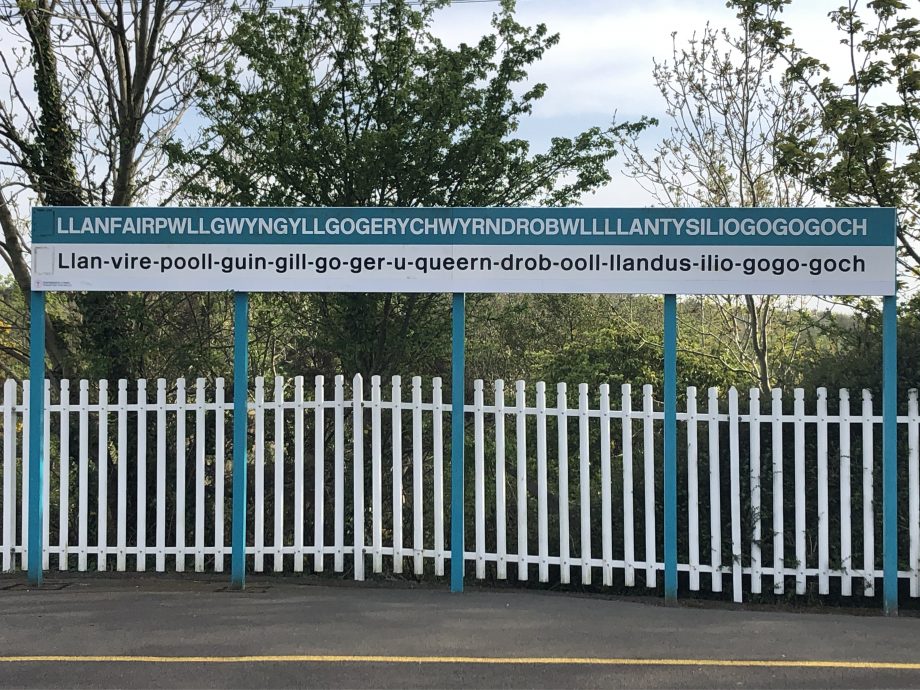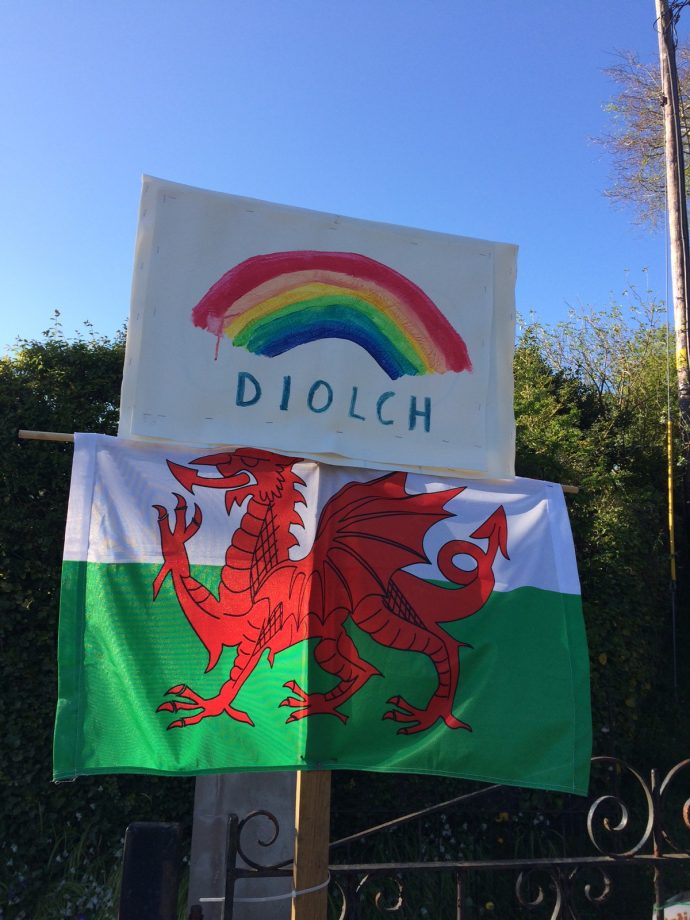What’s in a (Welsh) Name?
Local Inflections on Corona Infection
Like other strange phenomena, that arrived with the virus in Europe, it happened in Italy first. People fled the North of the country for the South in the hope of escaping to a safer region. In the UK, the direction of travel has been the other way around, from the South to the more rural – if poorer – Northern regions of the country. My own home in North Wales, renowned for its natural beauty, was not immune from this inverted flight.
‘Human geography’ started to feel a lot smaller in the lockdown, reducing travel to walking distances rather than those enabled by airplane, train or car. My partner and myself decided to stretch our legs one day in early March, from one local place to another. We travelled from Menai Bridge, on the Island of Anglesey, over to the nearby village of Llanfair PG, only two miles away. The latter’s name is an abbreviation of the longer one devised as a gimmick in the 19th century when railway links first connected this small Welsh town to the wider world.

The long sign at the railway station of Llanfair PG. Copyright: Frances Williams
The longest place-name in the UK, the sign here announces this place as ‘Llanfairpwllgwyngyllgogerychwyrndrobwllllantysiliogogogoch’. Though this ridicules the Welsh-speaking population for being unreasonably loquacious, the joke is actually made at the expense of the English (never keen to acknowledge or respect the cultural difference of the Welsh). More of a marketing ruse than cultural truth, it was devised as a way to draw in English tourists and more recently, American ones too. Pre-lockdown they would alight from Cruise ships docked at Holyhead. Next to the station is a large retail outlet called Byd O Siopa (World of Shopping) selling tacky souvenirs – slate coasters and Welsh rugby shirts.
Despite the brief formation of a ‘Free Wales Army’ in the 1970s, ‘Welshness’ has been cast primarily as a harmless cultural difference in the UK – even a quaint historical artefact. But political differences led to devolved government here in 1997. The Welsh acted on a sense of injury, as much as national pride, hurt by the misrule of Margaret Thatcher in the 1980s and her demolition of South Wales mining communities in particular. These cultural politics of emotion involved all too tangible ‘histories of hurt’ (Ahmed 2010: 144).
Devolution isn’t the same as any federal arrangement – such as those highlighted in the American response to the coronavirus with responsibilities passed between elected state governors and the president. Rather, it amounts in the UK, to ‘the dispersal of power from a superior to an inferior political authority’ (Bogdanor 1979: 36). Though secondary to Parliament, The Senedd (Welsh Assembly) nevertheless does offer some degree of decision latitude. This elected chamber spends an allocated block grant from Westminster on key areas under its control, including healthcare (‘NHS Wales’). Because the Welsh people have only elected Labour administrations, dividing lines have traditionally been drawn by party political difference. Former prime minister, David Cameron, once emotively called the Welsh border ‘a ‘dividing line between life and death’ (exploiting different lengths of waiting time for cancer treatments between each service). In the general election of 2019, however, many constituencies in North Wales fell to the Tory Party, including that of Ynys Mon (Anglesey). The Welsh Nationalist Party (Plaid Cymru) also saw a resurgence.
Our walking route takes us along the top road, with views out over Snowdonia. News reports, only the day before our walk, had shown people walking up Britain’s highest peak as though on holiday. The sight of queues of climbers had helped to prompt the introduction of more restrictive measures by the Westminster government in early March. As we enter the village, an old man stands in his garden and speaks to us in Welsh. ‘Mae’n braf heddiw’ (it’s a fine day today). I reply, ’Ydy, tydy’ (It is isn’t it). We relapse into English when my grasp of the language defeats me (though Welsh myself, I come from the Anglicised South). He is a retired-headmaster, he explains. I imagine he might be lonely, hanging out in the garden in order to talk to people passing by.
‘People from Rhosneigr brought it to the island’ he informs us, charting the first two cases of coronavirus on Anglesey. ‘They had a second home here.’ We joke about shutting the two bridges onto the island, but I am mindful of the rhetoric of the far right and their love of closing borders and erecting walls. Welsh nationalists have long harboured antagonism towards English people buying second homes at the expense of poorer locals. I wonder if this is the latest iteration of that old discourse, or a new inflection placed on top of it.
Since the outbreak, a number of people from outside Wales have arrived here in camper vans, occupying caravans and holiday cottages. The Welsh government had warned against this development, along with other areas of the UK (such as Scotland, which also has a tier of separate, devolved government). It puts extra demand on the health services in these rural places, they had argued, urging tourists to ‘go home’ as much as ‘stay home’. Both Welsh and Scottish devolved governments had led on lockdown polices ahead of England, advocating the earlier shut down of schools. This effectively forced England into acting along with them in the same week. Likewise, French President Emmanuel Macron had threatened to close the border with the UK unless it enforced stricter measures against the spread of the virus. I note the irony of borders being used to breach borders – exerting their own pressures for congruence along lines of subtle demarcation and power.
In a further twist, the ex-headmaster offers his own analysis of the local economy and its resilience in the face of the virus. ‘The man who runs the local pub has offered to make take away meals for the elderly’ he informs us. I imagine he endorses this generous change of plan. But it turns out he does not. ‘He is only doing it because he would go out of business if he didn’t!’ I am struck by his reading of the publican’s motivation which suggests that self-interest, as much as community spirit, is at work on this local level as much as any national one. I am reminded of the many texts on ‘localism’ I read for my PhD, including Lauren Berlant’s observation on ‘community’ as a political construction that plays on many (false) ideals. She points to a profound error in the ‘presumption that the local is the same thing as the communal, both experientially and institutionally’ (Berlant, 2004: 4).There is little romanticisation of the local community by this gentleman, busy planting potatoes in his front garden, eager to chat to strangers. He knows the pub chef in the village, all too well, it seems…
‘We need a local economy,’ I find myself answering in reply. ‘One that works in the interests of local people’. I bad mouth the prime minister Boris Johnson for his inaction and failure to support the self-employed. But to my surprise, the man cuts the Prime Minister a lot of slack. ‘He is doing his best’. I quote what the PM’s political advisor, Dominic Cummings reportedly said, that the death of many pensioners was a price worth paying for the sake of the economy. ‘I hope I get to see these grow. I am diabetic,’ he concludes our chat, darkly. ‘Hwyl fawr’ we wave good bye, ending as we began in the Welsh language, sounding a note of solidarity despite any political difference.
Two weeks on from this exchange, we take the same walk again, in mid-April. Much has changed. Many more people have contracted the virus, including the Prime Minister himself. The Welsh government has banned the use of caravan parks and holiday homes for the period of the pandemic. Regional differences in parts of the UK are being reported, with some areas (the Midlands) showing steeper rates of infection. The rise in cases in Wales is noted to be ‘steady’ (with over 600 deaths by 22 April, 2020).
Many economic and cultural explanations are proffered to explain these regional anomalies which include reference to ethnicity and culture. ‘Many south east Asian families live in Birmingham, with all the generations living together’. Other narratives are optimistically offered by a doctor working at the local hospital, relocated from her home in the south of England. She suggests that the inward-facing nature of Welsh-speaking local communities may serve to protect them from the worst ravages of the pandemic. ‘That may help’.
She tells me of rumours, in circulation at the hospital, that bricks have flung into the windows of second homes in Rhosneigr. In the same week, a ‘viral’ social media campaign springs us that satirises tourist posters of the past. These don’t promote the traditional ‘warm welcome’ of Wales but instead play on the notion of the ‘hostile environment’ (the controversial policy used by The Home Office use to make immigrants feel unwelcome in the UK). One parody features the town’s long sign doctored with a new ending that reads ‘-gogohome’. Another shows an image of snowdon with the line ‘Snowdontcha even think about visiting!’ The gentle humour relies on a certain underlaying Schadenfreude.

A resident of Llanfair PG says ‘Diolch’ (Thanks) to the NHS Wales on a sign outside their home. Copyright: Frances Williams
Repeatedly, in liberal circles, I hear the proposal that ‘community’ or ‘local’ solutions represent ways of addressing the problems brought about by the pandemic (as well as those that preceded it). These views arise out of a belief in devolution and localism as providing space for alternative thinking. But rather than offering ‘sites for social organisation or civic engagement’, I am mindful of those who also warn how the political ideal of localism can ‘avoid engagement with the marked inequalities that exist within and between places’ (Featherstone 2012: 3). Conditions of inequality provide the conditions that allow resentments to be grown, with legitimate grievances taking on poisonous dimensions.
A month into the pandemic and we retreat from our walks over to Llanfair PG, finding its elderly residents ever more fearful, no longer in the mood to chat. The unbounded nature of infection shows how close relations are not necessarily safer ones. Rather, we find ourselves in a novel new locality, a ‘byd bach’ (small world) that extends to every corner of the globe. Within that tight frame, social bonds are forged around exclusions as much as they affirm mutual commonalities – a sharp and painful focus drawn by the virus.
Written in March 2020, completed 24 April 2020
Frances Williams is a Visiting Researcher at Glyndwr University. She recently completed a PhD thesis on devolution in relation to the field of practice known as ‘Arts in Health’. Contact: francespushkin@outlook.com
References
Ahmed, Sara. 2010. The Promise of Happiness. USA: Duke University Press.
Berlant, Lauren. 2004. Compassion: The Culture and Politics of an Emotion. Essays from The English Institute. Routledge.
Bogdanor, Vernon. 1976. Devolution in the United Kingdom. Oxford: Oxford University Press.
Featherstone, D. et al. 2012. Progressive localism and the construction of political alternatives. Royal Geographical Society. Transactions of the Institute of British Geographers. 1-6.
doi: 10.1111/j.1475-5661.2011.00493.xISSN 0020-2754. Accessed 20 March 2020.































